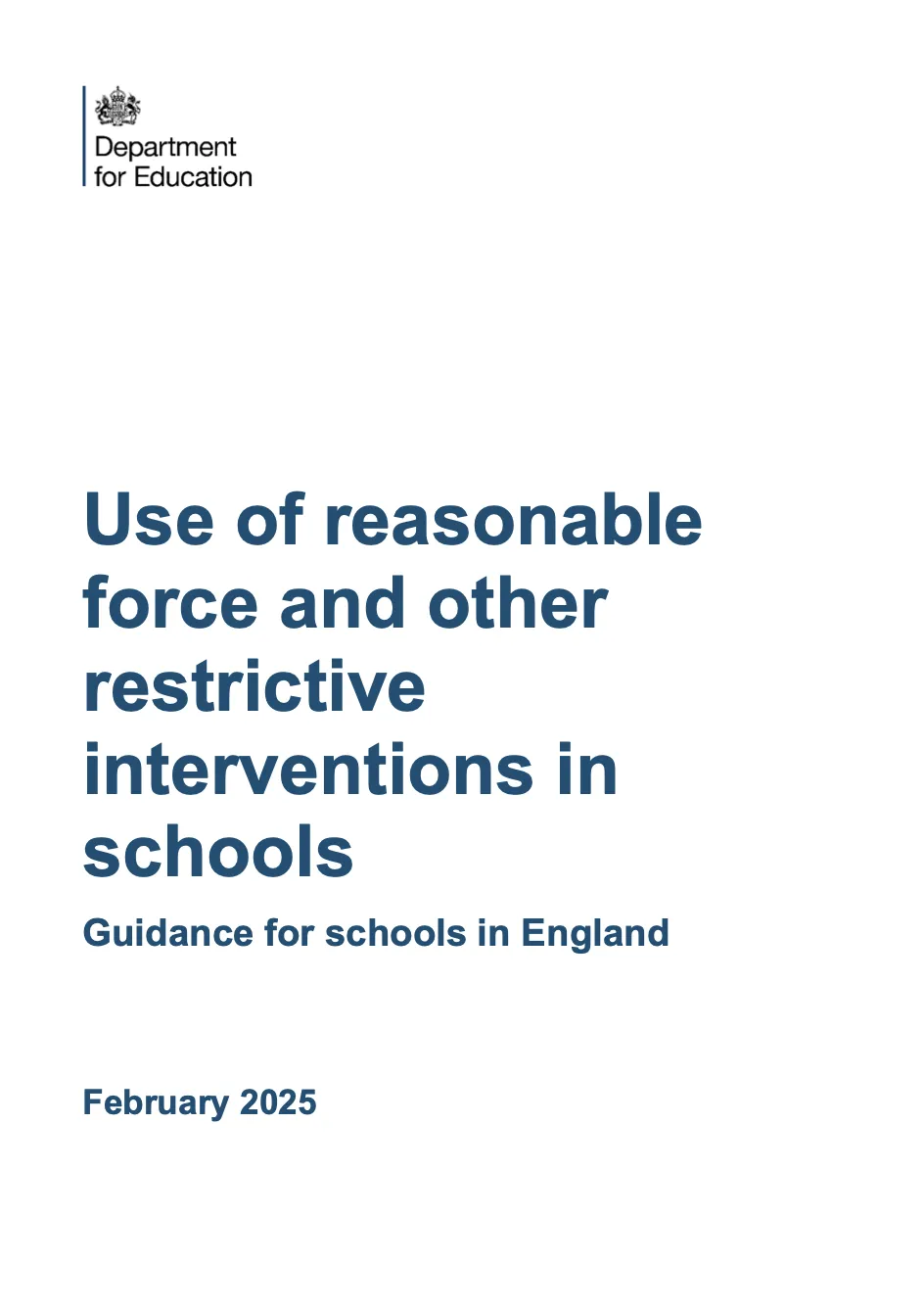
Revised 2025 Guidance: How Schools Must Record, Report, and Communicate Use of Reasonable Force
Revised Guidance on the Use of Reasonable Force and Restrictive Interventions in Schools: What School Leaders Need to Know
Published: 23 May 2025
From September 2025, all schools in England must comply with new statutory guidance on the use of reasonable force and restrictive interventions. This update from the Department for Education is designed to protect both pupils and staff, ensure transparency, and promote best practice in behaviour management.
What Is ‘Reasonable Force’ and a ‘Restrictive Intervention’?
Reasonable Force: Physical contact used by school staff to control or restrain a pupil—always the minimum necessary and only for as long as required.
Restrictive Interventions: Any action, planned or reactive, that limits a pupil’s movement, liberty, or freedom. This includes physical restraint and other methods that restrict a pupil’s ability to act independently.
Key Changes in the 2025 Guidance
Statutory Recording & Reporting: Every significant incident involving force must be recorded and reported in line with new legal requirements.
Emphasis on Prevention: Schools are encouraged to focus on early support, de-escalation, and positive behaviour support to minimise the need for restrictive interventions.
SEND Considerations: Clearer guidance for supporting pupils with special educational needs and disabilities (SEND), ensuring interventions are appropriate and tailored.
Defined Roles & Responsibilities: Greater clarity on the responsibilities of staff, leadership, and governing bodies.
Why Does This Matter for Schools?
Implementing the new guidance isn’t just about compliance—it’s about creating safer, more supportive environments for everyone:
Safeguarding Pupils and Staff: Preventing harm through clear, consistent procedures.
Transparency: Statutory recording and reporting build trust and accountability.
Data-Driven Improvement: Analysing incident data helps schools refine their approach and improve outcomes.
What Schools Must Do Now
1. Update Behaviour Policies
Ensure your policy aligns with the new legal requirements.
Clearly outline when and how reasonable force or restrictive interventions may be used.
Include procedures for recording, reporting, and reviewing incidents.
2. Train and Support Staff
Provide regular training on de-escalation and positive behaviour support.
Make sure staff understand their legal responsibilities and the needs of vulnerable pupils.
3. Implement Robust Recording and Reporting
Use digital tools to ensure every incident is logged quickly, securely, and in compliance with the new statutory requirements.
Review incidents regularly to identify patterns and inform improvement.
What Must Be Reported to Parents After an Incident?
A key part of the revised statutory guidance is transparency with parents and carers. From September 2025, schools are required to report each significant incident involving the use of force on a pupil to their parent(s) as soon as practicable, unless:
The pupil is aged 20 or over, or
Reporting is likely to result in significant harm to the pupil (in which case, the incident must be reported to the local authority).
The report to parents must include, at a minimum:
Time, date, location, and approximate duration of the incident and the use of force.
A brief account of the type of reasonable force appliedand the degree of force used.
Details of any physical injuries sustained by the pupil or staff, if applicable.
A brief explanation of why the use of force was assessed as necessary in that specific instance.
Best practice also suggests:
Inviting parents for a follow-up discussion about the incident, especially where it may help clarify triggers, warning signs, or the effectiveness of any agreed behaviour support plans.
Discussing de-escalation strategies used and their effectiveness.
Working collaboratively with parents to review and, if needed, amend the pupil’s behaviour support plan.
Reporting to parents is required even if the use of reasonable force is already agreed as part of a behaviour plan.
How to communicate:
Schools may choose the most appropriate method to communicate this information (e.g. phone call, email, or online messaging system), but timely and clear communication is essential.
How Behaviour Smart Can Help
Behaviour Smart’s incident recording and reporting system is designed to help schools seamlessly meet the new statutory requirements:
Quick, Secure Incident Logging: Record incidents in seconds with our user-friendly platform—our most requested feature!
Real-Time AI Behaviour Analysis: Instantly spot patterns and get actionable insights.
Compliant Data Storage & Reporting: Fully aligned with the latest statutory guidance, including robust audit trails and parent communication logs.
Tailored for All Settings: Packages for mainstream schools (Lite, Plus) and care/health settings (Care).
MIS Integration: Connects with your school’s MIS for streamlined data management.
Free Onboarding & Support: We’ll train your staff and help you get set up at no extra cost.
Post Incident Learning (PIL) App: Included with all packages, this app supports students, young people, and service users to reflect and learn after an incident, helping them develop better self-regulation skills. The PIL app can be used independently or with support and is customisable for individual communication needs.
Ready for September 2025?
Don’t leave compliance to chance. With Behaviour Smart, you can:
Meet all statutory recording and reporting requirements
Support your staff and safeguard your pupils
Turn incident data into positive change
Book a demo or get in touch today to see how Behaviour Smart can help your school prepare for the revised guidance.
Contact Behaviour Smart:

Email: [email protected]
Phone: 07498 219287



